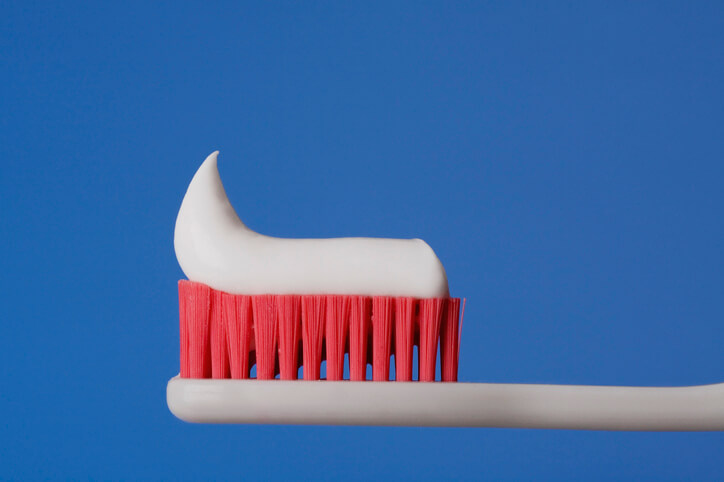If You Have a Milk Allergy, Steer Clear of This Toothpaste
6 years ago | Allergies
By Joy Stephenson-Laws, JD, Founder
Did you know that allergies are one of the most common chronic diseases? According to the Centers for Disease Control and Prevention (CDC), allergies are the 6th leading cause of chronic illness in the United States with an annual cost in excess of $18 billion. The CDC reports that more than 50 million Americans suffer from allergies each year.
Many things, including certain foods, specific medications, pollen and other materials in the environment, insect bites (think bee sting), latex, pet dander and some household and personal hygiene products, may cause allergies.
Depending on the person, an allergic reaction can be just really bothersome or actually be very serious and life-threatening. And the most common cause of anaphylaxis (a potentially fatal, total body allergic reaction that can cause very low blood pressure and difficulty breathing) are food allergies.
So I was shocked to hear about a very tragic story where an 11-year-old girl recently died from an allergic reaction to toothpaste. The little girl’s name was Denise Saldate, and she was allergic to dairy.
(This source says allergic conditions are the most common health issues affecting children in the United States).
According to one report, per her dentist’s instructions Saldate began using a prescribed, medicated toothpaste called MI Paste One. Saldate’s dentist wanted her to use this particular toothpaste in order to strengthen her tooth enamel.
Unbeknownst to her parents, the toothpaste contained dairy ingredients. Specifically, the toothpaste contained Recaldent, which is the trademark name of a naturally occurring protein found in cow’s milk. It is said to help strengthen teeth by delivering calcium (an essential mineral) and phosphate (which contains the essential mineral phosphorus) to the enamel of the teeth, which helps “remineralize the areas that have been affected by plaque bacteria,” this source reports.
Due to her severe allergy, Saldate went into anaphylactic shock from using the toothpaste. Her mother administered an EpiPen and gave her daughter her inhaler. Her family called 911, and her mother was told to begin CPR (her oxygen was being cut off as a result of the allergic reaction). Saldate was taken away in an ambulance. Two days later, she died.
Always Check Labels
Saldate’s mother said there was a warning label regarding the milk protein in the toothpaste, but she just didn’t think to look. I think many of us could make the same mistake. I didn’t know until after reading this story that toothpaste could contain milk products.
A pediatric allergist in this CNN report said, “This is the first time I've ever heard anything remotely like this,” (he’s been practicing for 13 years).
“There are food proteins in many different medications and nonfood products," he said. "But by and large, the type of food and the amount of food is not nearly enough to cause any reaction in the vast majority of people with food allergies."
(Furthermore, the CNN report says the toothpaste the little girl used is not commonly used).
“Almost all deaths from an allergic reaction to food happen because the child or young adult had an underlying condition such as asthma that made the reaction more severe, and there's almost always either a lack of or a delay in the administration of epinephrine [an EpiPen], he [the doctor] said.”
I can’t say for sure, but because Saldate’s mother gave her an inhaler along with the EpiPen when she went into shock, I suspect the little girl suffered from asthma as well.
Besides Checking Labels, How Else Can We Be Proactive?
Know the signs of an allergic reaction to toothpaste. Here are a few, according to Colgate:
- Having a severe form of chapped lips (known as cheilitis)
- Rash around the mouth
- Colgate notes the story of a 35-year-old woman who had cheilitis for nine months. This went away once she changed her toothpaste.
Ingredients in toothpaste some people may be allergic to:
- Gluten
- Fluoride (olaflur, a type of fluoride)
- Fragrances
- Flavorings
- Cinnamon derivatives (such as cinnamic aldehyde)
What else you can do
- Get a patch test. You can also do a full round of testing with pH Allergies.
- Consider allergy immunotherapy. If allergies are very bad, immunotherapy may be of help to you. It is a form of therapy that delivers the allergen into your body in small doses so that you can hopefully build up an immunity over time.
- Educate yourself about nutritional solutions to tooth health. Maybe you won’t need that prescription toothpaste. You can read all about this, here.
- Always have an EpiPen readily available. These are life-saving. Ask your allergist about having an epinephrine auto-injection kit you can keep at home and travel with.
Do you have allergies? What has been your experience? Please join the conversation.
Enjoy your healthy life!
The pH professional health care team includes recognized experts from a variety of health care and related disciplines, including physicians, attorneys, nutritionists, nurses and certified fitness instructors. This team also includes the members of the pH Medical Advisory Board, which constantly monitors all pH programs, products and services. To learn more about the pH Medical Advisory Board, click here.







